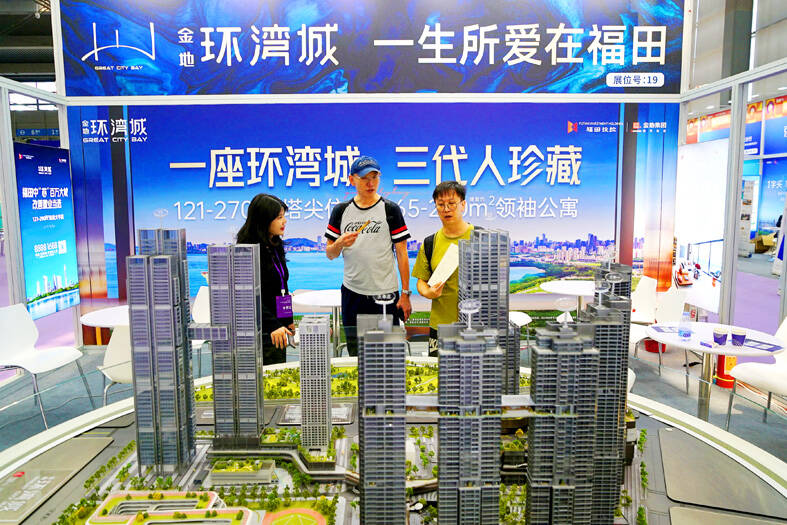China’s regulators pledged to boost efforts to stabilize the housing and equity markets, as well as conduct more effective fiscal policies, in the wake of a meeting of top leaders that called for greater stimulus.
The government would promote the recovery of the property market through measures such as increasing demand and controlling the supply of land for new development, China News Service reported, citing Chinese Vice Minister of Housing and Urban-Rural Development Dong Jianguo (董建國) at a conference on Saturday.
The China Securities Regulatory Commission said it would enhance market monitoring for futures and spot trading, and strengthen supervision of margin trading, derivatives and quantitative trading, according to a statement on its Web site.

Photo: REUTERS
The Chinese Ministry of Finance said it would implement more effective and sustained fiscal policies next year, as well as improve macroeconomic regulations.
The government would also increase the issuance and usage of local government special bonds and expand their investment areas, according to a statement on its Web site.
The comments come after officials led by Chinese President Xi Jinping (習近平) vowed to raise the fiscal deficit target next year following a two-day huddle of the Chinese Central Economic Work Conference in Beijing. For only the second time in at least a decade, they made “lifting consumption vigorously” and stimulating overall domestic demand their top priority.
China’s struggling economy has rebounded modestly in recent weeks on the back of more government support, with signs of improvement in consumption and factory activity.
However, overall confidence remains frail because policies have not been strong enough to free the economy from deflation.
In a sign of the challenges facing policymakers, China’s credit expansion unexpectedly slowed last month, figures showed on Friday. Loans extended to the real economy, which exclude those issued to financial institutions, fell to the lowest for the month of November since 2009. That offset elevated government bond issuance to drag down overall credit growth.
More easing is on the cards. China would cut interest rates and the reserve requirement ratio in a timely manner next year, the 21st Century Business Herald reported on Saturday, citing Wang Xin (王信), director of the research bureau under the People’s Bank of China (PBOC).
The central bank would increase the intensity of monetary and credit supply, Wang said at an event on Saturday, according to the report. Financing conditions for the real economy would also be relaxed further, it cited Wang as saying.
The comments came days after the Chinese politburo pledged to embrace a “moderately loose” monetary policy next year.
The central bank would also improve how it manages exchange rate expectations and guard against any shocks next year, a senior official said.
The PBOC would “step up expectation management on exchange rates and vigorously respond to external shocks,” the monetary policy department head Zou Lan (鄒瀾) told state media in an interview published on Friday.
In addition, the central bank would “resolutely prevent risks of overshooting in the exchange rate,” he said.
The yuan has fallen sharply since mid-October and slid on Thursday after a media report said authorities were considering letting it depreciate in response to the threat of a trade war with the US.

In Italy’s storied gold-making hubs, jewelers are reworking their designs to trim gold content as they race to blunt the effect of record prices and appeal to shoppers watching their budgets. Gold prices hit a record high on Thursday, surging near US$5,600 an ounce, more than double a year ago as geopolitical concerns and jitters over trade pushed investors toward the safe-haven asset. The rally is putting undue pressure on small artisans as they face mounting demands from customers, including international brands, to produce cheaper items, from signature pieces to wedding rings, according to interviews with four independent jewelers in Italy’s main

Macronix International Co (旺宏), the world’s biggest NOR flash memory supplier, yesterday said it would spend NT$22 billion (US$699.1 million) on capacity expansion this year to increase its production of mid-to-low-density memory chips as the world’s major memorychip suppliers are phasing out the market. The company said its planned capital expenditures are about 11 times higher than the NT$1.8 billion it spent on new facilities and equipment last year. A majority of this year’s outlay would be allocated to step up capacity of multi-level cell (MLC) NAND flash memory chips, which are used in embedded multimedia cards (eMMC), a managed

In the wake of strong global demand for AI applications, Taiwan’s export-oriented economy accelerated with the composite index of economic indicators flashing the first “red” light in December for one year, indicating the economy is in booming mode, the National Development Council (NDC) said yesterday. Moreover, the index of leading indicators, which gauges the potential state of the economy over the next six months, also moved higher in December amid growing optimism over the outlook, the NDC said. In December, the index of economic indicators rose one point from a month earlier to 38, at the lower end of the “red” light.

The global server market is expected to grow 12.8 percent annually this year, with artificial intelligence (AI) servers projected to account for 16.5 percent, driven by continued investment in AI infrastructure by major cloud service providers (CSPs), market researcher TrendForce Corp (集邦科技) said yesterday. Global AI server shipments this year are expected to increase 28 percent year-on-year to more than 2.7 million units, driven by sustained demand from CSPs and government sovereign cloud projects, TrendForce analyst Frank Kung (龔明德) told the Taipei Times. Demand for GPU-based AI servers, including Nvidia Corp’s GB and Vera Rubin rack systems, is expected to remain high,